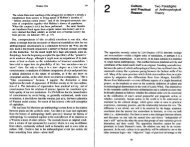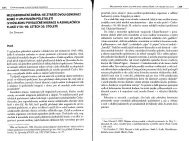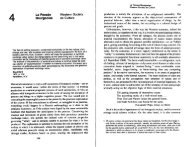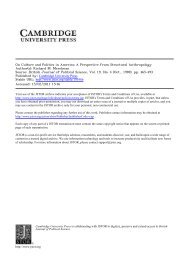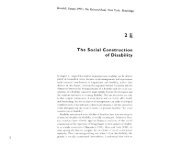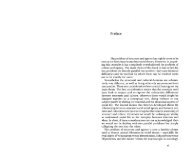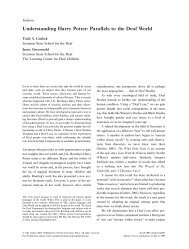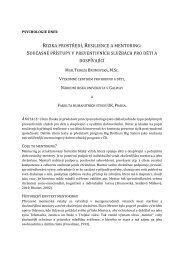Morphogenesis versus Structuration: On Combining ... - Moodle
Morphogenesis versus Structuration: On Combining ... - Moodle
Morphogenesis versus Structuration: On Combining ... - Moodle
You also want an ePaper? Increase the reach of your titles
YUMPU automatically turns print PDFs into web optimized ePapers that Google loves.
<strong>Morphogenesis</strong> <strong>versus</strong> structuration 481<br />
Sociology', in M. S. Archer, Social<br />
Origins of Educational Systems,<br />
London and Beverly Hills, Sage, 1979,<br />
pp.5-42.<br />
15. Giddens, Central Problems in<br />
Social Theory, op. cit., p. 5.<br />
16. Ibid., p. 69.<br />
17. I am indebted to Dr John<br />
Heritage for this insight.<br />
18. Ibid,p.56.<br />
19. Ibid, p. 210.<br />
20. Ibid., p. 71.<br />
21. Ibid.,pp.77-8.<br />
22. Ibid., pp. 69 -70.<br />
23. Ibid., pp. 50 -2.<br />
24. Ibid.,p. 104.<br />
25. Activation need not involve<br />
power relations unless Giddens's premise<br />
that all action is logically tied to<br />
power is accepted. See ibid., p. 88.<br />
26. Ibid., p. 80.<br />
27. As Gellner succinctly puts it,<br />
group variables 'can indeed only exist<br />
if their parts exist-that is indeed the<br />
predicament of all wholes-but their<br />
fates qua fates of complexes can<br />
nevertheless be the initial condition or<br />
indeed the final condition of a causal<br />
sequence', 'Holism Versus Individualism',<br />
in May Brodbeck, Readings in<br />
the Philosophy of the Social Sciences,<br />
op. cit., p. 263.<br />
28. For example I have tried to show<br />
at length how a centralized system of<br />
education conditions subsequent patterns<br />
of educational interaction and<br />
profoundly influences the processes by<br />
which change can be introduced in<br />
ways quite different from those<br />
characteristic of decentralized systems.<br />
See my Social Origins of Educational<br />
Systems, op. cit., especially ch. 5,<br />
pp. 265-8.<br />
29. Giddens, Central Problems in<br />
Social Theory, op. cit., p. 78.<br />
30. Ibid., p. 76.<br />
31. Ibid,p. 144.<br />
32. M. Maruyama, 'The Second<br />
Cybernetics: Deviation-Amplifying<br />
Mutual Causal Processes'; op. cit.,<br />
p. 164.<br />
33. Giddens, Central Problems in<br />
Social Theory, op. cit., p. 215.<br />
34. Ibid., p. 7.<br />
35. Ibid, p. 229.<br />
3 6. Amitai Etzioni provides the<br />
boldest illustrations of this point in his<br />
discussions of 'under' and 'over<br />
managed societies and their typical<br />
and very different kinds of crises, The<br />
Active Society, op. cit.<br />
37. Giddens, Central Problems in<br />
So cial Theory, op. cit., p. 93 *<br />
38. See R. J. W. Selleck, English<br />
Primary Education and the Progressives,<br />
1914-3 9, London, Routledge<br />
& Kegan Paul, 19 7 2.<br />
39. It should be clear from the foregoing<br />
that I endorse Lukess approach<br />
to the concept of power rather than<br />
that of Giddens. <strong>On</strong>ce again this is a<br />
cluestion of dualism <strong>versus</strong> duality.<br />
Lukes maintains analytical dualism by<br />
seeking to draw a line between structural<br />
determination and the exercise of<br />
power. Hence he talks of 'where<br />
structural determination ends and<br />
power begins' (S. Lukes, Essays in<br />
Social Theory, London, Macmillan, p.<br />
18) and is predictably chastized by<br />
Giddens for tending to 'repeat the<br />
dualism of agency and structure'<br />
(Central Problems in Social Theory,<br />
op. cit., p. 91). Giddens wants to overcome<br />
this divide by defining power as<br />
'transformative capacity', hence maintaining<br />
duality by viewing structure<br />
as implicated in power relations and<br />
power relations as implicated in<br />
structure. Now Lukes does not deny<br />
these interconnections but he avoids<br />
Giddens's compacting of the two<br />
elements which blurs the distinction<br />
between responsible action and determined<br />
action, severing the tie between<br />
power and responsibility which is<br />
essential to Lukes. <strong>On</strong> the contrary he<br />
tries to discover, explain and assess the<br />
weight of structural limitations on<br />
action which delimit the zone in which<br />
it is proper (and profitable) to speak<br />
of power relations. Thus to Lukes, in<br />
general, 'although the agents operate<br />
within structurally defined limits, they<br />
none the less have a certain relative<br />
autonomy and could have acted differently'<br />
(Lukes, ibid., p. 6-7). What is<br />
then required in this dualistic approach<br />
'is a sustained discussion of the nature<br />
of, and conditions for, autonomy (and



